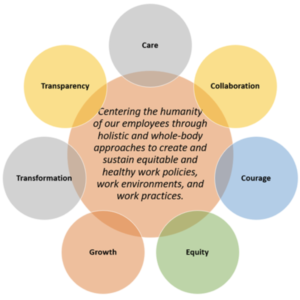In Spring 2021, the Office of Human Resources (OHR) established the Office of Equity, Inclusion & Employee Well-Being. This shift in the OHR organizational structure recognizes the inextricable link between equity, diversity and inclusion with employee well-being. Employees who are not emotionally, mentally, physically, and socially well are unable to authentically and successfully engage in their work, cannot grow and thrive on campus, and are more likely to leave the institution. This is particularly true for marginalized and/or underrepresented employees on campus.
Mission
To provide high-level consultation, support and resources to schools, colleges, divisions and units to support the creation and sustainability of healthy, equitable and inclusive policies, systems, and environments for employees to engage, grow, and thrive on campus.
Vision
To center the humanity of our employees through holistic, whole-person and whole-body approaches to create and sustain equitable and healthy work policies, work environments, and work practices.
Values
The core values of the Equity, Inclusion and Employee Well-being unit outline a shared understanding and shared commitments, expectations, and accountability of how we engage in decision-making and approach our collective work.

- Care
We approach our work, our working relationships, and ourselves with care. We will strive to learn and understand the needs of those that we work with to act with care and compassion. We will also center our own care to approach our work authentically, fully, and collectively.
- Collaboration
We approach our work through collaboration. The work of equity, diversity, inclusion and well-being is never done in isolation. We rely on developing and sustaining diverse partnerships to build coalitions to align organizational goals and to effectively transform the employee experience.
- Courage
We approach our work with courage. We acknowledge that the work of equity, diversity, inclusion and well-being is dynamic and challenging. We commit to engaging in courageous inquiry, learning and listening.
- Equity
We approach our work with an equity-focused lens. We commit to proactively working to identify, understand, and dismantle historical and current structural inequities in our policies, systems and environments. The pursuit of equity is never finished. It requires constant, systemic, and devoted effort. A sustained commitment to improving health for all—and particularly for those most in need—must be a deeply held value throughout society.
- Growth
We approach our work with openness, growth, and a desire to innovate. As an office that centers learning, we commit to seeking feedback and continually improving, informing, and sharing our work.
- Transformation
We approach our work through transformation. We acknowledge that current policies, systems, and environments are disproportionately impacting marginalized groups of employees. We commit to advocating for the values, practices, relationships and environments we need to collectively thrive and transform current structures.
- Transparency
We approach our work with transparency. We commit to openly share information about our processes to create space for ongoing feedback, dialogue for new ways of practice, and space for our stakeholders to hold us accountable to our values and goals.
Our Approach
The Office of Equity, Inclusion & Employee Well-Being uses a needs-based approach to:
- Advocate for the prioritization of equity, inclusion and well-being in all policies, systems, environments, practices, procedures, services and programs to transform and improve the employee experience.
- Raise awareness of employees’ needs to mobilize the campus community.
- Provide support to the campus community to create work environments that foster equity, inclusion, and well-being.
- Create supportive, welcoming spaces that foster a sense of community among marginalized and/or underrepresented employee groups.
- Build organizational and individual capacity to support equity, inclusion and employee well-being and reduce harm.